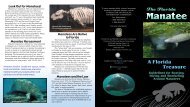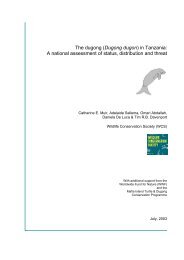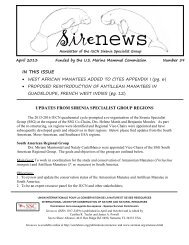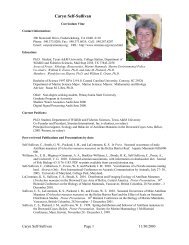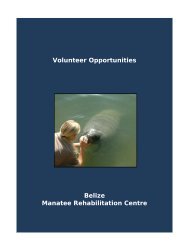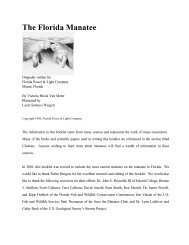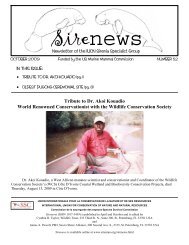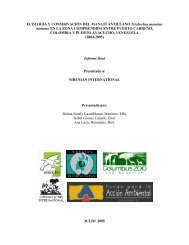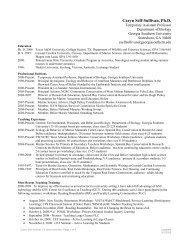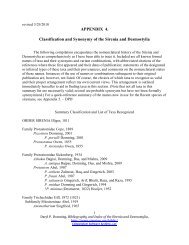2012 COURSE DATES: AUGUST 4 – 17, 2012 - Sirenian International
2012 COURSE DATES: AUGUST 4 – 17, 2012 - Sirenian International
2012 COURSE DATES: AUGUST 4 – 17, 2012 - Sirenian International
Create successful ePaper yourself
Turn your PDF publications into a flip-book with our unique Google optimized e-Paper software.
injured manatees. For example, how will a captive raised<br />
calf learn to find warm water effluents during cold spells?<br />
Can adult manatees learn successful migration routes or<br />
must they be learned during early development? From an<br />
ultimate perspective, manatees are also quite challenging<br />
due to the lack of closely related extant species and to the<br />
sparse fossil record. But, paleo-sirenian research by Daryl<br />
Domning, and others, continues to offer insight to the<br />
evolution and function of modern manatee behaviors.<br />
Why are there fewer sirenian species today than during the<br />
past? Does the evolution of the species Homo correlate<br />
with the decline of sirenians or were other environmental<br />
factors the reason for their extinctions? Will answers to<br />
these and other ultimate questions aid in our conservation<br />
efforts?<br />
Although manatees are generally considered elusive,<br />
there are cases where they appear to be curious and actually<br />
initiate contact with humans. Likewise, many behaviors<br />
tend vary between individuals, populations, and species.<br />
Because of the variable nature of manatee behavior, we<br />
must be careful in applying what we know about the Florida<br />
population to other areas. The Florida subspecies is<br />
fortunate to have the efforts of many US citizens and<br />
agencies working toward conservation issues and manatee<br />
behavior plays and important role in making management<br />
decisions in Florida. However, West Indian manatees are<br />
considered endangered throughout their range. Continued<br />
research effort on populations in the more tropical regions<br />
of the Caribbean is necessary for decision makers in those<br />
countries to make effective management decisions.<br />
REFERENCES<br />
Alcock, John. 1998. Animal Behavior. Sixth edition.<br />
Sunderland, Massachusetts: Sinauer Associates,<br />
Inc. 640 pp.<br />
Anderson, Paul K. 1997. Shark Bay dugongs in summer. I:<br />
Lek mating. Behaviour. 134(5-6):433-462.<br />
Auil, Nicole. 1998. Belize Manatee Recovery Plan.<br />
UNDP/GEF Coastal Zone Management Project,<br />
BZE/92/G31, Belize/UNEP Caribbean<br />
Environment Programme, Kingston, Jamaica. 67<br />
pp.<br />
Bengtson, John L. 1981. Ecology of Manatees Trichechus<br />
manatus) in the St. Johns River, Florida. Ph. D.<br />
thesis. University of Minnesota.<br />
Bengtson, John L., and Shannon M. Fitzgerald. 1985.<br />
Potential role of vocalizations in West Indian<br />
manatees. Journal of Mammalogy. 66(4):816-<br />
819.<br />
Domning, Daryl P. 1980. Feeding position preference in<br />
manatees (Trichechus). Journal of Mammalogy<br />
61(3):544-547.<br />
Domning, Daryl P. 1982. Evolution of manatees: a<br />
speculative history. Journal of Paleontology.<br />
56(3):599-619.<br />
10<br />
Domning, Daryl P., and Lee-Ann Hayek. 1984. Horizontal<br />
tooth replacement in the Amazonian manatee.<br />
Mammalia 48:105-127.<br />
Drickamer, Lee C., Stephen H. Vessey, and Doug Meikle.<br />
1996. Animal Behavior: Mechanisms, Ecology,<br />
Evolution. Fourth edition. Boston: William C.<br />
Brown Publishers. 447 pp.<br />
Fischer, M. S. 1990. The unique ear of elephants and<br />
manatees (Mammalia): a phylogenetic paradox.<br />
C. R. Acad. Sci., Paris, SER. III, vol. 31, no. 4, pp.<br />
157-162.<br />
Gaeth, A. P., R. V. Short and M. B. Renfree. 1999. The<br />
developing renal, reproductive, and respiratory<br />
systems of the Africa elephant suggest an aquatic<br />
ancestry. Proceedings of the National Academy of<br />
Sciences of the United States of America<br />
96(10):5555-5558.<br />
Hartman, Daniel S. 1979. Ecology and behavior of the<br />
manatee (Trichechus manatus) in Florida. Special<br />
publication no. 5. American Society of<br />
Mammalogists. 153 pp. ISBN 0-9436-1204-7.<br />
Hernandez, Patricia, John E. Reynolds, III, Helene Marsh,<br />
and Miriam Marmontel. 1995. Age and<br />
seasonality in spermatogenesis of Florida<br />
manatees. pp. 84-95 in Thomas J. O'Shea, Bruce<br />
B. Ackerman, and H. Franklin Percival, editors.<br />
Population biology of the Florida manatee.<br />
National Biological Service Information and<br />
Technology Report 1.<br />
Husar, Sandra L. 1977. The West Indian manatee<br />
Trichechus manatus. Wildlife Research Report<br />
No. 7. U. S. Department of the Interior, Fish and<br />
Wildlife Service, Washington, D.C. 22 pp.<br />
Irvin, A. Blair. 1983. Manatee metabolism and its<br />
influence on distribution in Florida. Biological<br />
Conservation. 25:315-334.<br />
Koelsch, Jessica K. 1997. The Seasonal Occurrence and<br />
Ecology of Florida Manatees (Trichechus manatus<br />
latirostris) in Coastal Waters near Sarasota,<br />
Florida. Masters thesis. University of South<br />
Florida. Tampa, Florida.<br />
Lefebvre, Lynn W., Thomas J. O'Shea, Galen B. Rathbun,<br />
and R. C. Best. 1989. Distribution, status, and<br />
biogeography of the West Indian manatee. pp.<br />
567-610 in Biogeography of the West Indies. ed.<br />
Charles A. Woods. Gainesville, FL: Sandhill<br />
Crane Press. ISBN 0-8493-2001-1.<br />
Lehner, Philip N. 1996. Handbook of Ethological<br />
Methods, 2 nd edition. Cambridge University Press.<br />
672 pp.<br />
Maluf, N. S. R. 1995. Kidney of elephants. Anatomical<br />
Record 242(4):491-514.<br />
Marmontel, Miriam. 1995. Age and reproduction in<br />
female Florida manatees. Pages 98-119 in Thomas<br />
J. O'Shea, Bruce B. Ackerman, and H. Franklin<br />
Percival, editors. Population biology of the



